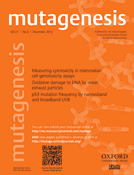
MUTAGENESIS
Scope & Guideline
Exploring the impact of mutagenesis on human health.
Introduction
Aims and Scopes
- Genotoxicity Assessment:
The journal emphasizes studies that evaluate the genotoxic potential of various substances using in vitro and in vivo methodologies, including the development and validation of novel assays. - Molecular Mechanisms of Mutagenesis:
Research exploring the underlying molecular and cellular mechanisms that lead to mutations, including DNA damage responses and repair pathways, is a core area of focus. - Environmental and Occupational Health:
Papers addressing the impact of environmental pollutants and occupational exposures on genetic stability and health outcomes are prominently featured, highlighting the journal's commitment to public health. - Cancer Genetics and Epigenetics:
The journal publishes research on the genetic and epigenetic factors contributing to cancer development, including studies on specific gene mutations and their clinical implications. - Innovative Therapeutics:
A unique contribution of the journal is its focus on next-generation therapeutics and their role in mitigating genetic damage and cancer risk, integrating basic research with clinical applications.
Trending and Emerging
- MicroRNA and Gene Regulation:
Research investigating the role of microRNAs in cancer chemoresistance and genetic instability is on the rise, indicating a growing interest in post-transcriptional regulation as a factor in mutagenesis. - Impact of COVID-19 on Genetic Stability:
Studies exploring the genetic effects of COVID-19 and its long-term implications on health outcomes are emerging, reflecting the pandemic's influence on research priorities. - Nanomaterials and Genotoxicity:
An increasing number of papers are focusing on the genotoxic potential of nanomaterials, showcasing the need for updated risk assessments in light of their widespread use. - Environmental Mutagenesis:
A notable trend is the increasing emphasis on environmental factors and their contributions to genetic damage, particularly in relation to air pollution and chemical exposures. - 3D and In Vitro Models:
There is a growing interest in the development and application of advanced in vitro models, including 3D tissue constructs, for more accurate assessments of genotoxicity and cancer risk.
Declining or Waning
- Traditional Genotoxicity Testing Methods:
The focus on classical genotoxicity assays, such as the Ames test and micronucleus assays, has decreased as newer methodologies and technologies are being developed and adopted. - Single-Agent Toxicity Studies:
Research concentrating solely on the effects of individual genotoxic agents is becoming less frequent, as there is a growing interest in understanding combined effects and real-world exposures. - Basic Toxicology without Molecular Insights:
Studies that provide basic toxicological data without delving into molecular mechanisms or implications for human health are increasingly rare, reflecting a shift towards more integrative research approaches.
Similar Journals
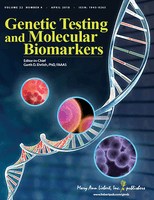
Genetic Testing and Molecular Biomarkers
Bridging Genetics and Medicine for a Healthier Tomorrow.Genetic Testing and Molecular Biomarkers, an esteemed journal published by MARY ANN LIEBERT, INC, serves as a pivotal platform for advancing the field of genetic research and its applications in medicine. Focused on the innovative intersections of genetics and biomarker discovery, this journal has consistently contributed meaningful insights since its inception in 2009, with its scope evolving through 2024. With an ISSN of 1945-0265 and an E-ISSN of 1945-0257, it offers both traditional and open access options to cater to a broad audience of researchers, professionals, and students. Despite its current classification in the Q4 and Q3 quartiles for Genetics (clinical) and Medicine (miscellaneous) respectively, the journal remains committed to publishing high-quality, peer-reviewed articles that push the boundaries of knowledge in the field. As the landscape of genomic medicine continues to expand, Genetic Testing and Molecular Biomarkers is positioned as a crucial resource for disseminating cutting-edge discoveries and fostering interdisciplinary collaboration.

Emerging Contaminants
Bridging research and real-world impact on health.Emerging Contaminants is a leading international journal dedicated to the exploration and analysis of novel pollutants, their effects, and the methodologies for their detection and remediation. Published by KEAI PUBLISHING LTD in China, this Open Access journal has been at the forefront of scientific discourse since its inception in 2015, allowing unrestricted access to cutting-edge research. With an impressive categorization in the top Q1 quartile across diverse fields, including Health, Toxicology and Mutagenesis, and Public Health, it ranks remarkably high—41st out of 665 in Public Health and 10th out of 133 in Toxicology according to Scopus metrics, demonstrating its vital role in advancing our understanding of environmental health risks. By bridging the gap between academia and practical applications, Emerging Contaminants not only enriches the scientific community but also serves as an essential resource for policymakers and industry leaders seeking effective solutions to environmental challenges. Researchers, professionals, and students alike are encouraged to engage with the journal’s comprehensive studies and findings, contributing to a sustainable future.

TOXICOLOGY
Pioneering studies that shape the future of toxicological safety.TOXICOLOGY, published by Elsevier Ireland Ltd, is a prestigious peer-reviewed journal specializing in the field of toxicology. With an ISSN of 0300-483X and an E-ISSN of 1879-3185, this journal provides a vital platform for researchers, professionals, and students to disseminate and access groundbreaking studies from 1973 to present, with a convergence set until 2024. Recognized for its high impact, it holds a Q1 ranking in Toxicology category and ranks #18 out of 133 in Scopus's sector of Pharmacology, Toxicology, and Pharmaceutics, placing it in the 86th percentile. While the journal is not open access, it nonetheless offers a rich collection of research articles that enhance the understanding of toxicological science and its applications. The journal's objectives encompass advancing knowledge in the toxicological evaluation of substances, promoting safety in public health, and fostering dialogue among scholars. As a key resource in the field, TOXICOLOGY plays a crucial role in advancing research and informing practices related to toxicological risks and safety assessments.
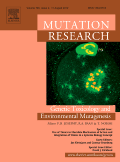
MUTATION RESEARCH-GENETIC TOXICOLOGY AND ENVIRONMENTAL MUTAGENESIS
Illuminating the impact of environmental factors on genetic integrity.MUTATION RESEARCH-GENETIC TOXICOLOGY AND ENVIRONMENTAL MUTAGENESIS, published by Elsevier, is a renowned journal that explores critical advancements in the field of genetic toxicology and environmental mutagenesis. With an ISSN of 1383-5718 and an E-ISSN of 1879-3592, it ranks in Q3 for Genetics and Q2 for Health, Toxicology, and Mutagenesis as of 2023. This journal not only emphasizes the importance of environmental factors in genetic material alterations but also disseminates significant research findings that aid in understanding the implications for public health and safety. Operating from Amsterdam, Netherlands, it serves as a pivotal platform for researchers, professionals, and students, fostering an informed community keen on evolving the parameters of genetic research. Although it currently does not offer open access, the journal's commitment to high-quality peer-reviewed content ensures substantial contributions to the academic literature, enhancing our comprehension of mutagenic processes and their environmental triggers.

Life Science Alliance
Fostering Collaboration for a Healthier Tomorrow.Life Science Alliance, published by LIFE SCIENCE ALLIANCE LLC, is a premier open access journal that has been making significant contributions to the fields of Biochemistry, Genetics and Molecular Biology, Ecology, Health, Toxicology and Mutagenesis, and Plant Science since its inception in 2018. With an impressive ranking in Scopus, including Q1 quartile positions and high percentiles in relevant categories, this journal is a vital resource for researchers, professionals, and students alike who seek to advance knowledge and innovation in life sciences. The journal operates on an open access model, ensuring that research findings are freely available to the global scientific community, thereby enhancing the visibility and impact of published work. With a commitment to fostering collaboration and disseminating high-quality research, Life Science Alliance serves as an essential platform for the promotion and exchange of scientific knowledge, aiming to bridge gaps and stimulate discussions across multiple disciplines.

INDUSTRIAL HEALTH
Elevating Standards in Environmental and Occupational HealthINDUSTRIAL HEALTH is a premier journal dedicated to the dissemination of innovative research in the fields of public health, environmental and occupational health, as well as toxicology and mutagenesis. Published by the National Institute of Occupational Safety and Health in Japan, the journal has been a critical resource for over six decades, covering essential topics from 1963 to the present day. With an impressive placement in the second quartile (Q2) of the Public Health, Environmental and Occupational Health category and a third quartile (Q3) in Health, Toxicology, and Mutagenesis, it is recognized for its significant contribution to advancing knowledge and improving practices within the industry. While not an open-access journal, INDUSTRIAL HEALTH offers researchers and students access to a wealth of knowledge through its rich archive of articles, fostering a deeper understanding of health and safety challenges in industrial settings. The journal’s dedication to high-quality research and its strategic role in promoting occupational safety make it an invaluable asset for professionals seeking to enhance health standards and safety protocols worldwide.

Epigenomes
Bridging Disciplines to Unravel Epigenetic MysteriesEpigenomes is a distinguished open access journal published by MDPI, dedicated to advancing the field of epigenetics and its interdisciplinary connections to biochemistry, genetics, and molecular biology. Since its inception in 2017, this journal has provided a transparent platform for researchers to share their findings, contributing to a deeper understanding of epigenetic mechanisms and their implications in health, toxicology, and mutagenesis. Ranked in the Q2 quartile across multiple categories, including biochemistry and genetics, Epigenomes is recognized for its scholarly contributions, reflected in its notable Scopus rankings. Readers benefit from a wealth of open access articles, fostering innovation and collaboration within the academic community. With its headquarters in Switzerland and an unwavering commitment to scientific rigor, Epigenomes is positioned as a vital resource for researchers, professionals, and students seeking to deepen their insights into the epigenomic landscape.

Gene Reports is a prominent academic journal published by Elsevier that focuses on the rapidly evolving field of genetics. Launched in 2015, this journal serves as a pivotal platform for the dissemination of cutting-edge research, bridging the gap between basic and applied genetics studies. Although it currently holds a Q4 ranking in the Genetics category and stands at the 248th position out of 347 in Scopus rankings, its potential for growth is significant given the increasing interest in genetic research across various disciplines. With an E-ISSN of 2452-0144, Gene Reports aims to provide open access to original research articles, reviews, and short communications that advance the collective understanding of genetic mechanisms and their applications. As a publication that continues to shape the future of genetics, it is an essential resource for researchers, professionals, and students seeking to stay informed about the latest developments in this crucial field.
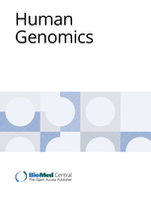
Human Genomics
Bridging Knowledge and Accessibility in GenomicsHuman Genomics, published by BMC, is a leading open-access journal dedicated to advancing the field of genomics and its applications in health and disease. Since its inception in 2003, the journal has provided a vital platform for researchers to disseminate groundbreaking findings related to genetic research, contributing significantly to areas such as Drug Discovery, Genetics, Molecular Biology, and Molecular Medicine, as reflected in its Q1 and Q2 quartile rankings throughout 2023. With an ISSN of 1473-9542 and an E-ISSN of 1479-7364, Human Genomics not only delivers high-quality, peer-reviewed research but also ensures accessibility to a broader audience, empowering professionals, students, and academics to stay at the forefront of genomic science. Through its rigorous editorial standards and impactful publications, the journal fosters a collaborative environment for innovative research across the globe from its base in the United Kingdom. By promoting open access since its launch, Human Genomics continues to enhance the visibility and impact of genetic studies, making it an essential resource for anyone involved in the rapidly evolving field of human genomics.
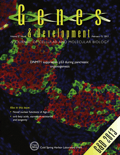
GENES & DEVELOPMENT
Unraveling the Mysteries of Genes and DevelopmentGENES & DEVELOPMENT, published by COLD SPRING HARBOR LAB PRESS, stands as a premier journal in the fields of Developmental Biology and Genetics, boasting a remarkable impact factor that reflects its prestigious position in the academic community—ranking Q1 in both disciplines as of 2023. Since its inception in 1987, this journal has been at the forefront of disseminating cutting-edge research, effectively bridging the gap between laboratory breakthroughs and their applications in health and disease. Researchers and professionals rely on GENES & DEVELOPMENT for its rigorous peer-review process and its commitment to promoting innovative studies that unravel the complexities of gene functions and developmental processes. With Scopus rankings placing it in the top percentile among its peers, this journal serves as a vital resource for students and established scientists alike, aspiring to expand their knowledge and contribute to the ever-evolving landscape of genetic and developmental research.